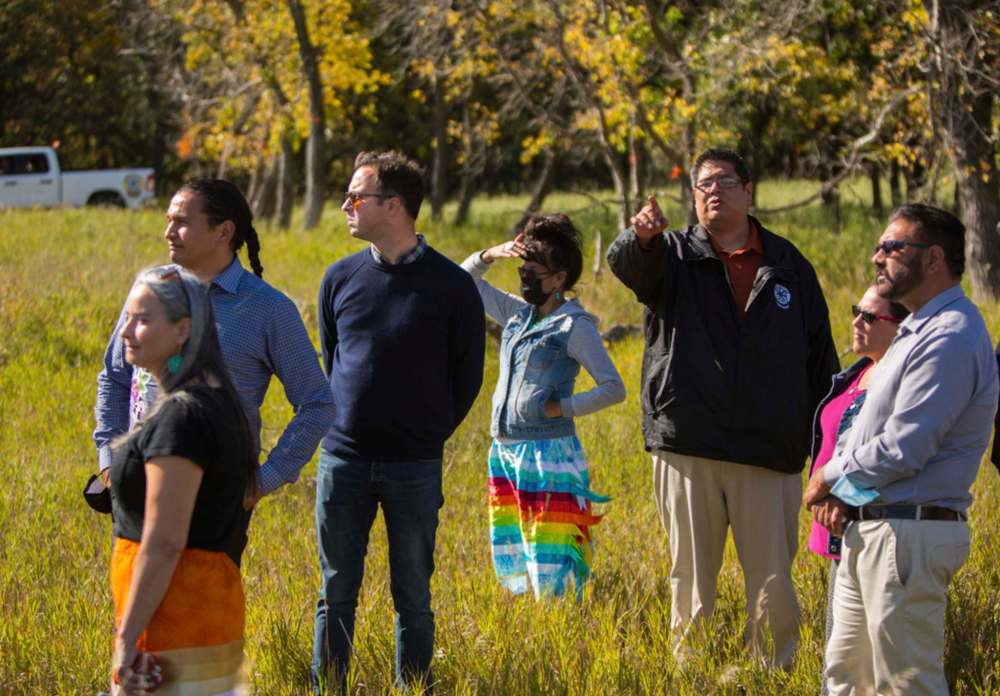NDP caucus tours former residential school site in Brandon
Advertisement
Read this article for free:
or
Already have an account? Log in here »
To continue reading, please subscribe:
Monthly Digital Subscription
$0 for the first 4 weeks*
- Enjoy unlimited reading on winnipegfreepress.com
- Read the E-Edition, our digital replica newspaper
- Access News Break, our award-winning app
- Play interactive puzzles
*No charge for 4 weeks then price increases to the regular rate of $19.00 plus GST every four weeks. Offer available to new and qualified returning subscribers only. Cancel any time.
Monthly Digital Subscription
$4.75/week*
- Enjoy unlimited reading on winnipegfreepress.com
- Read the E-Edition, our digital replica newspaper
- Access News Break, our award-winning app
- Play interactive puzzles
*Billed as $19 plus GST every four weeks. Cancel any time.
To continue reading, please subscribe:
Add Free Press access to your Brandon Sun subscription for only an additional
$1 for the first 4 weeks*
*Your next subscription payment will increase by $1.00 and you will be charged $16.99 plus GST for four weeks. After four weeks, your payment will increase to $23.99 plus GST every four weeks.
Read unlimited articles for free today:
or
Already have an account? Log in here »
Hey there, time traveller!
This article was published 23/09/2021 (1542 days ago), so information in it may no longer be current.
BRANDON — THE Manitoba NDP caucus toured the former Brandon residential school Wednesday as guests of Sioux Valley Dakota Nation.
Chief Jennifer Bone said they were honoured to host the NDP on the first day of its retreat in Brandon.
She said she hopes the caucus gained a better understanding of the impact of residential schools in First Nations and the need to investigate unmarked graves. It’s believed there are 104 graves at the site.

“Sioux Valley has been carrying on with our own project in relation to the residential schools since 2012,” Bone said. “It makes people aware of the history of residential schools and how it has brought us to where we are today.”
It was powerful to see Dakota elders share their stories with the politicians, she said.
“(The NDP caucus) have a better understanding of what we have gone through as Indigenous people, and what we continue to go through,” Bone said.
Healing is needed in communities, she said, and the calls to actions cited by the Truth and Reconciliation Commission show there is unfinished work in Canada. She added many issues must be addressed to see true reconciliation take place.
“We’ve come a long way… but there’s still a lot of work that needs to be done,” Bone said.
Sioux Valley has hosted other groups at the site, including Manitoba Keewatinowi Okimakanak and Southern Chiefs Organization. Bone said Sioux Valley wants to see groups work together to ensure students buried at former residential schools can find their way home.
NDP Leader Wab Kinew said given the conversations surrounding former residential schools and unmarked graves in Canada this year, it was important to reach out to Sioux Valley because they have stepped up as caretaker for the Brandon residential school site.
“I am the son of a residential school survivor. I’ve heard many recollections and memories and it never fails to have an emotional impact, even though I’ve probably heard from residential school survivors more than the average person,” Kinew said. “Listening to the people talk today about some very painful memories from their childhood and how it affected their family relationships for years afterwards, it really affects you on an emotional level.”
Kinew said there is a pressing need to take action because there is a short window of time to preserve the stories and oral histories of survivors. He expects that within the next two decades or so, the voices of those who attended residential schools will be lost.
Kinew would like to see work done to commemorate and honour survivors. This can be in the form of dates like the National Day for Truth and Reconciliation on Sept. 30 or through installations that honour survivors and victims at the former Brandon school site.
“You have to have people dedicated to it, people whose job it is to move the work of commemorations and education forward,” Kinew said. “As people involved in the provincial system, I think that’s what we’ll be pushing for — a dedicated task force, dedicated resources to help make this work happen.”
Sioux Valley Coun. Elton Taylor and Simon Fraser University PhD candidate Katherine Nichols spoke to guests about the potential unmarked graves at the site. Nichols is originally from the Brandon area, and Sioux Valley chief and council and other landowners have collaborated with her to identify graves.
“These children need the respect and the honour that they deserve. We honour and respect all other cemeteries and all other graves. Why are these ones being left out and unattended? Why aren’t these ones protected in the same manner as all others? It is an injustice that these kids are left out,” Taylor said.
Each site with potential unmarked graves is unique, and it’s important to use all available evidence, including survivors’ stories, archival records, archeology and forensic anthropology, to identify potential areas of interest.
The duo provided a tour of the area, highlighting the site of the former school and potential unmarked graves. They are currently working to confirm locations and figure out how to best protect and honour the children found in a way desired by their communities.
The project to have the graves recognized has been underway for more than a decade, Taylor said, and it can be a challenging task when the changes and answers needed are at the institutional level provincially and nationally.
— Brandon Sun



